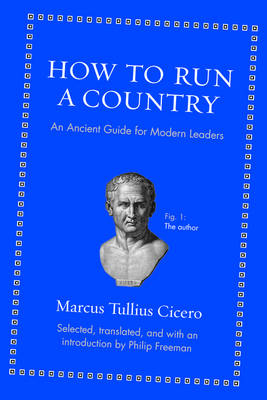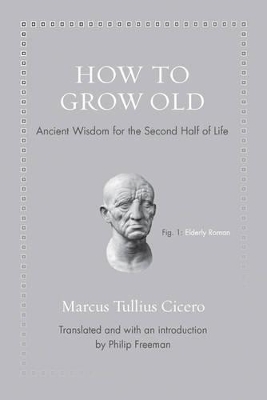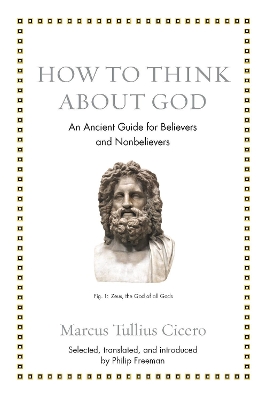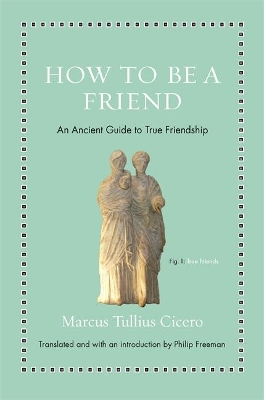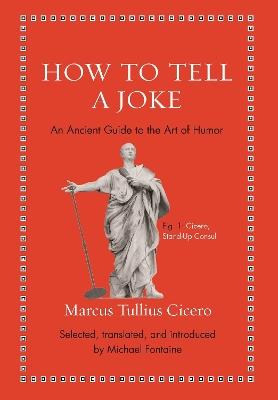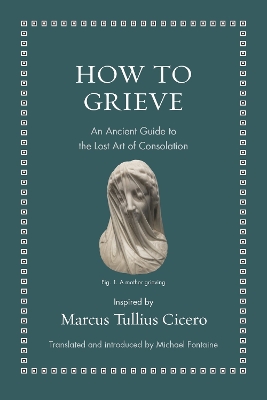Ancient Wisdom for Modern Readers
6 total works
Organized by topic and featuring lively new translations, the book also includes an introduction, headnotes, a glossary, suggestions for further reading, and an appendix containing the original Latin texts. The result is an enlightening introduction to some of the most enduring political wisdom of all time.
A vivid and accessible new translation of Cicero's influential writings on the Stoic idea of the divine
Most ancient Romans were deeply religious and their world was overflowing with gods-from Jupiter, Minerva, and Mars to countless local divinities, household gods, and ancestral spirits. One of the most influential Roman perspectives on religion came from a nonreligious belief system that is finding new adherents even today: Stoicism. How did the Stoics think about religion? In How to Think about God, Philip Freeman presents vivid new translations of Cicero's On the Nature of the Gods and The Dream of Scipio. In these brief works, Cicero offers a Stoic view of belief, divinity, and human immortality, giving eloquent expression to the religious ideas of one of the most popular schools of Roman and Greek philosophy.
On the Nature of the Gods and The Dream of Scipio are Cicero's best-known and most important writings on religion, and they have profoundly shaped Christian and non-Christian thought for more than two thousand years, influencing such luminaries as Augustine, Thomas Aquinas, Dante, and Thomas Jefferson. These works reveal many of the religious aspects of Stoicism, including an understanding of the universe as a materialistic yet continuous and living whole in which both the gods and a supreme God are essential elements.
Featuring an introduction, suggestions for further reading, and the original Latin on facing pages, How to Think about God is a compelling guide to the Stoic view of the divine.
A splendid new translation of one of the greatest books on friendship ever written
In a world where social media, online relationships, and relentless self-absorption threaten the very idea of deep and lasting friendships, the search for true friends is more important than ever. In this short book, which is one of the greatest ever written on the subject, the famous Roman politician and philosopher Cicero offers a compelling guide to finding, keeping, and appreciating friends. With wit and wisdom, Cicero shows us not only how to build friendships but also why they must be a key part of our lives. For, as Cicero says, life without friends is not worth living.
Filled with timeless advice and insights, Cicero's heartfelt and moving classic-written in 44 BC and originally titled De Amicitia-has inspired readers for more than two thousand years, from St. Augustine and Dante to Thomas Jefferson and John Adams. Presented here in a lively new translation with the original Latin on facing pages and an inviting introduction, How to Be a Friend explores how to choose the right friends, how to avoid the pitfalls of friendship, and how to live with friends in good times and bad. Cicero also praises what he sees as the deepest kind of friendship-one in which two people find in each other "another self" or a kindred soul.
An honest and eloquent guide to finding and treasuring true friends, How to Be a Friend speaks as powerfully today as when it was first written.
Timeless advice about how to use humor to win over any audience
Can jokes win a hostile room, a hopeless argument, or even an election? You bet they can, according to Cicero, and he knew what he was talking about. One of Rome's greatest politicians, speakers, and lawyers, Cicero was also reputedly one of antiquity's funniest people. After he was elected commander-in-chief and head of state, his enemies even started calling him "the stand-up Consul." How to Tell a Joke provides a lively new translation of Cicero's essential writing on humor alongside that of the later Roman orator and educator Quintilian. The result is a timeless practical guide to how a well-timed joke can win over any audience.
As powerful as jokes can be, they are also hugely risky. The line between a witty joke and an offensive one isn't always clear. Cross it and you'll look like a clown, or worse. Here, Cicero and Quintilian explore every aspect of telling jokes-while avoiding costly mistakes. Presenting the sections on humor in Cicero's On the Ideal Orator and Quintilian's The Education of the Orator, complete with an enlightening introduction and the original Latin on facing pages, How to Tell a Joke examines the risks and rewards of humor and analyzes basic types that readers can use to write their own jokes.
Filled with insight, wit, and examples, including more than a few lawyer jokes, How to Tell a Joke will appeal to anyone interested in humor or the art of public speaking.
An engaging new translation of a timeless masterpiece about coping with the death of a loved one
In 45 BCE, the Roman statesman Cicero fell to pieces when his beloved daughter, Tullia, died from complications of childbirth. But from the depths of despair, Cicero fought his way back. In an effort to cope with his loss, he wrote a consolation speech—not for others, as had always been done, but for himself. And it worked. Cicero’s Consolation was something new in literature, equal parts philosophy and motivational speech. Drawing on the full range of Greek philosophy and Roman history, Cicero convinced himself that death and loss are part of life, and that if others have survived them, we can, too; resilience, endurance, and fortitude are the way forward.
Lost in antiquity, Cicero’s Consolation was recreated in the Renaissance from hints in Cicero’s other writings and the Greek and Latin consolatory tradition. The resulting masterpiece—translated here for the first time in 250 years—is infused throughout with Cicero’s thought and spirit.
Complete with the original Latin on facing pages and an inviting introduction, Michael Fontaine’s engaging translation makes this searching exploration of grief available to readers once again.
